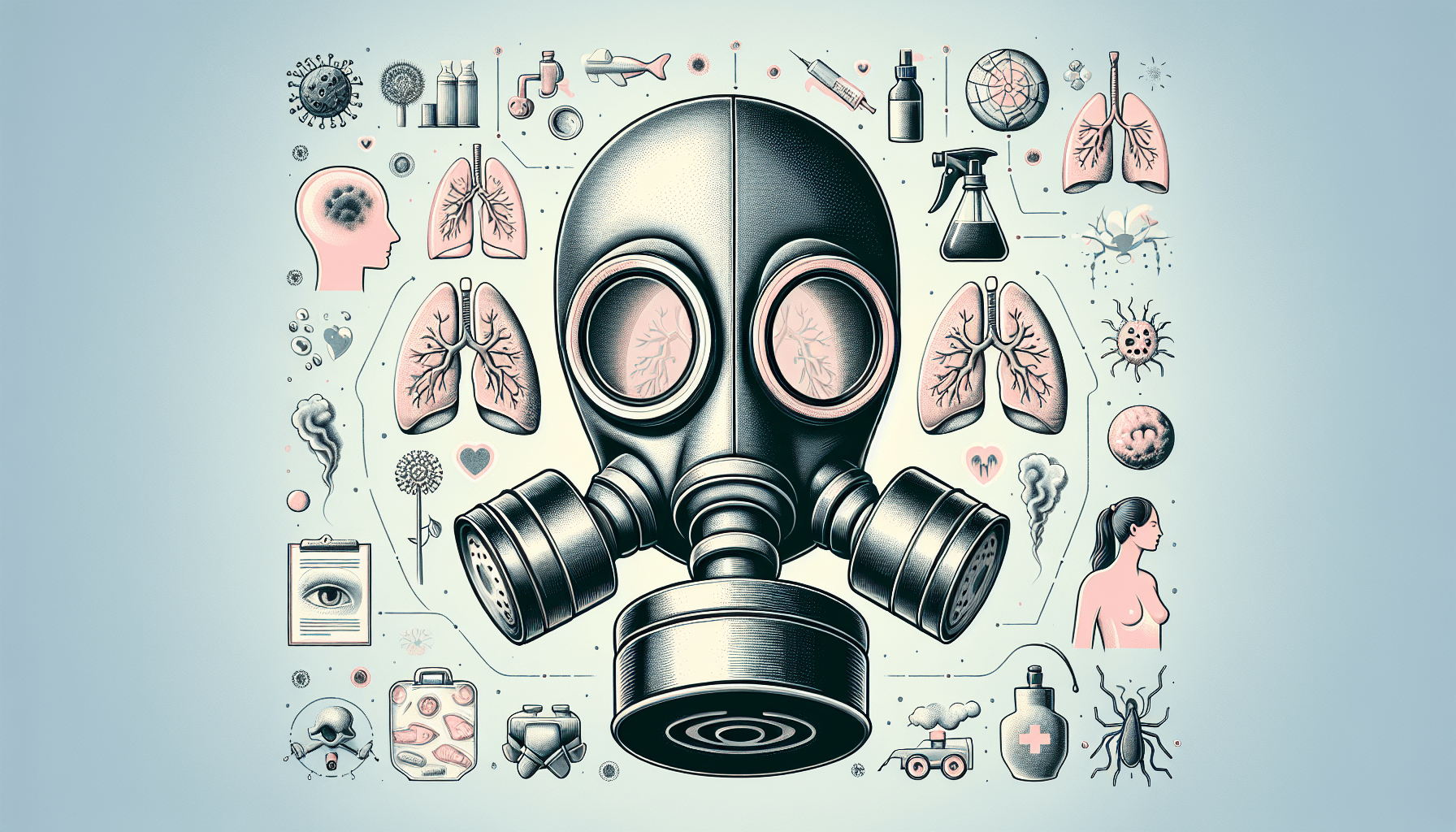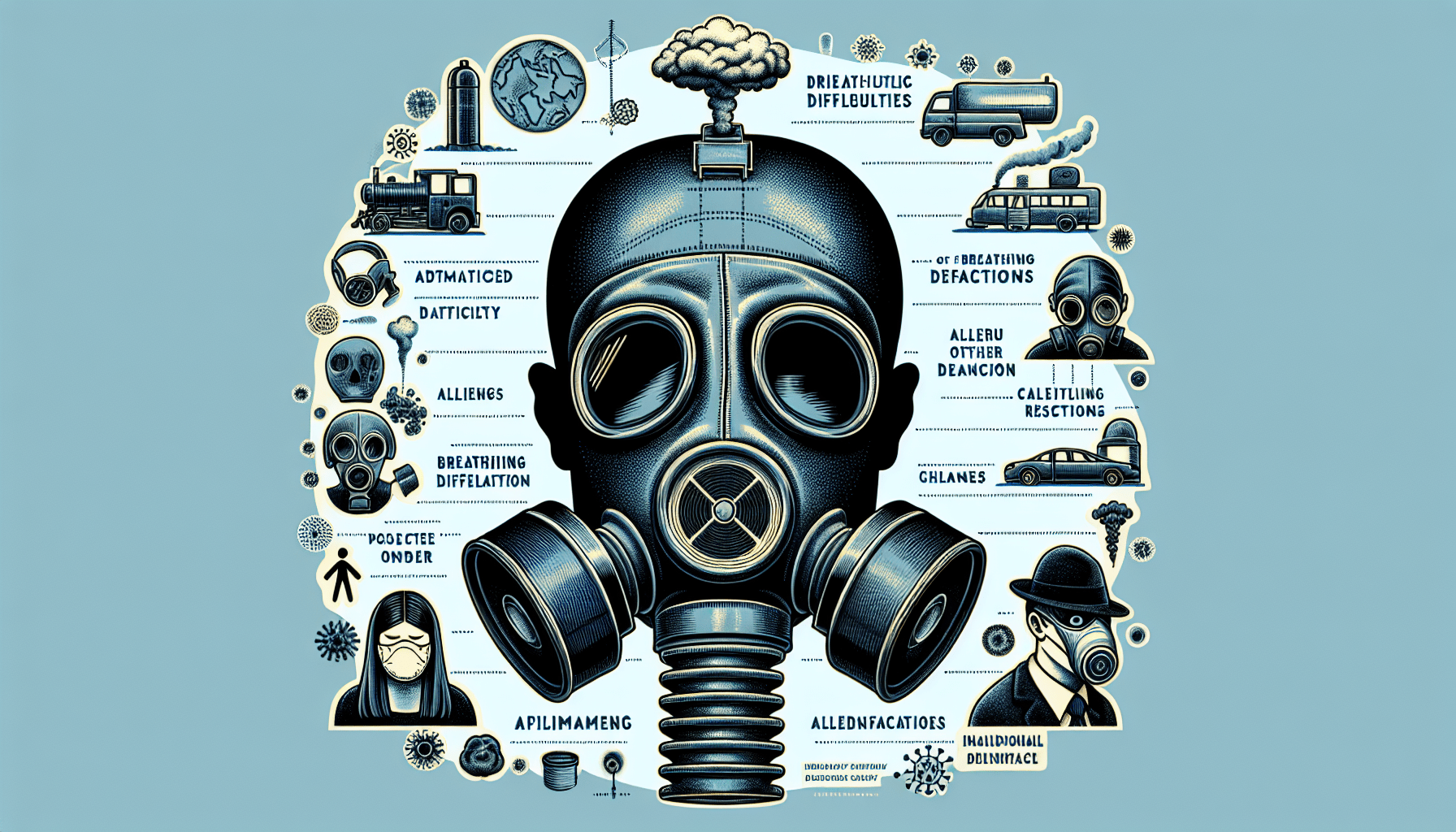Air pollution poses a significant threat to our well-being, affecting every breath we take. From respiratory issues to cardiovascular diseases, the detrimental impact of polluted air on our health cannot be ignored. In this article, discover the various health problems caused by air pollution and gain insight into the measures we can take to safeguard ourselves against this silent menace. So, let us explore the grave consequences of breathing in polluted air and empower ourselves with knowledge to protect our precious health.
Respiratory Issues
Asthma
Asthma is a chronic respiratory condition that affects millions of people worldwide. It is characterized by inflammation and narrowing of the airways, leading to symptoms such as wheezing, coughing, shortness of breath, and chest tightness. Exposure to air pollution, particularly fine particles and ozone, has been linked to the development and exacerbation of asthma. Prolonged exposure to polluted air can trigger asthma attacks and make it more difficult to control the condition. It is important to manage asthma effectively and take necessary precautions to minimize exposure to air pollutants.
Chronic Obstructive Pulmonary Disease (COPD)
COPD is a progressive lung disease that includes chronic bronchitis and emphysema. It is often caused by long-term exposure to harmful airborne substances, with tobacco smoke being a major contributor. However, air pollution is also a significant risk factor for COPD. The pollutants in the air can irritate the airways and cause inflammation, leading to the chronic inflammation associated with COPD. People with COPD may experience coughing, shortness of breath, excessive mucus production, and fatigue. Avoiding exposure to polluted air is crucial in managing COPD and slowing down its progression.
Bronchitis
Bronchitis is an inflammation of the bronchial tubes, which carry air to and from the lungs. It can be classified as acute or chronic, depending on its duration. Exposure to air pollution, particularly particle pollution and sulfur dioxide, has been linked to an increased risk of bronchitis. High levels of air pollution can irritate the bronchial tubes and lead to inflammation, causing symptoms such as cough, chest discomfort, and excessive phlegm production.
Pneumonia
Pneumonia is an infection that inflames the air sacs in one or both lungs. Although mainly caused by viruses or bacteria, air pollution can also contribute to the development of pneumonia. Pollution particles can penetrate deep into the respiratory system, making it easier for pathogens to enter the lungs and cause infection. Pneumonia symptoms include cough, fever, difficulty breathing, and chest pain. It is important to protect your respiratory health by minimizing exposure to air pollution and maintaining good hygiene practices.
Cardiovascular Disorders
Heart Disease
Air pollution has been linked to an increased risk of heart disease, including heart attacks, strokes, and other cardiovascular problems. The fine particles present in polluted air can enter the bloodstream and trigger inflammation in the blood vessels, leading to the formation of plaques and narrowing of the arteries. This can ultimately lead to heart disease, as it restricts blood flow to the heart and other vital organs. It is essential to prioritize heart health by reducing exposure to air pollution and adopting a heart-healthy lifestyle.
Stroke
Studies have shown a clear association between air pollution and the risk of stroke. The pollutants in the air, particularly fine particles, can enter the bloodstream and contribute to the formation of blood clots. These clots can then block blood flow to the brain, leading to a stroke. Individuals exposed to higher levels of air pollution are more likely to suffer from strokes, which can have severe and long-lasting consequences. Taking measures to reduce exposure to air pollution can help lower the risk of stroke and protect brain health.
High Blood Pressure
Air pollution has been identified as a risk factor for high blood pressure, also known as hypertension. The pollutants in the air can cause oxidative stress and inflammation, which can negatively impact the cardiovascular system. Prolonged exposure to air pollution can increase blood pressure levels, increasing the risk of heart disease, stroke, and other cardiovascular complications. Monitoring blood pressure regularly and taking appropriate steps to reduce exposure to air pollution are crucial in maintaining cardiovascular health.

Lung Cancer
Increased Risk
Exposure to air pollution, especially certain carcinogenic pollutants, has been associated with an increased risk of developing lung cancer. Fine particles, volatile organic compounds (VOCs), and Polycyclic Aromatic Hydrocarbons (PAHs) present in polluted air can be inhaled and deposited in the lungs. Over time, these pollutants can cause genetic mutations and damage the lung cells, leading to the development of cancerous tumors. Smokers and individuals with prolonged exposure to air pollution are particularly at a higher risk of developing lung cancer.
Development
The development of lung cancer is a complex process that involves multiple genetic and environmental factors. Alongside tobacco smoke, air pollution is a significant environmental factor contributing to the development of lung cancer. The presence of harmful pollutants in the air can interact with the genetic material in lung cells, leading to genetic mutations and abnormal cell growth. It is crucial to be aware of the risks associated with air pollution and take preventive measures for lung cancer, such as avoiding exposure to polluted air and quitting smoking.
Allergies
Hay Fever
Air pollution can worsen symptoms of hay fever, also known as allergic rhinitis, which is characterized by sneezing, congestion, runny nose, and itchy eyes. Pollen and other allergens in the air can combine with pollutants, such as ozone and nitrogen dioxide, to form harmful compounds. These compounds can trigger inflammation in the nasal passages, exacerbating the symptoms of hay fever. Minimizing exposure to air pollutants, especially during peak allergy seasons, can help alleviate hay fever symptoms.
Skin Irritation
Air pollution can also contribute to skin irritation and various skin disorders. Particulate matter, volatile organic compounds, and other pollutants can settle on the skin’s surface and penetrate through the pores, disrupting the natural barrier function of the skin. This can lead to dryness, redness, itching, and even the development of conditions such as eczema and acne. Proper skincare routines, regular cleansing, and minimizing exposure to polluted air can help protect the skin and maintain its health.

Premature Death
Increased Mortality Rate
Long-term exposure to air pollution has been linked to an increased risk of premature death. The harmful pollutants in the air, especially fine particles, can enter the bloodstream and cause systemic inflammation and oxidative stress. This can contribute to the development and progression of various chronic diseases, such as respiratory disorders, cardiovascular diseases, and cancer, which can ultimately lead to premature death. Mitigating air pollution and implementing effective public health measures are essential in reducing the mortality rate associated with air pollution.
Life Expectancy Reduction
The impact of air pollution on public health extends to a reduction in life expectancy. Prolonged exposure to polluted air can lead to the development of chronic and life-threatening diseases, ultimately shortening an individual’s lifespan. The hazardous components of air pollution, including fine particles and toxic gases, can cause significant damage to multiple organ systems, accelerating the aging process and increasing vulnerability to various health problems. Efforts to improve air quality and protect public health will play a crucial role in maintaining and even increasing life expectancy.
Reduced Lung Function
Decreased Lung Capacity
Exposure to air pollution has been shown to reduce lung capacity, making it harder for individuals to breathe properly and efficiently. The pollutants present in the air can irritate the airways and cause inflammation, leading to the narrowing of the bronchial tubes. This, in turn, reduces lung capacity and the amount of air that can be inhaled and exhaled. It can result in symptoms such as shortness of breath, wheezing, and a feeling of tightness in the chest. Protecting your lungs from pollution and engaging in regular exercise to maintain lung function are important for respiratory health.
Impaired Respiratory Efficiency
Air pollution can impair the respiratory system’s efficiency by causing damage to the lung tissues and interfering with the oxygen exchange process. The pollutants in the air can lead to the formation of scar tissues in the lungs, impairing their ability to expand and contract properly. This can result in reduced oxygen intake and the accumulation of waste gases, leading to symptoms like fatigue, decreased stamina, and shortness of breath. Regular respiratory exercises and avoidance of polluted environments are crucial in maintaining optimal respiratory efficiency.

Neurological Problems
Cognitive Decline
Long-term exposure to air pollution has been associated with cognitive decline and an increased risk of neurodegenerative diseases, such as Alzheimer’s disease and other forms of dementia. The fine particles and toxic gases in the air can enter the bloodstream and travel to the brain, leading to inflammation and oxidative stress. This can damage the brain cells and contribute to the progressive deterioration of cognitive function. Taking steps to minimize exposure to air pollution, including staying indoors during high pollution periods, can help protect brain health and reduce the risk of cognitive decline.
Alzheimer’s Disease
Research suggests a potential link between air pollution and the development of Alzheimer’s disease, a neurodegenerative disorder characterized by memory loss and cognitive decline. The presence of fine particles and chemical pollutants in the air can directly enter the brain and contribute to the accumulation of beta-amyloid plaques, a hallmark feature of Alzheimer’s disease. These plaques disrupt normal brain function and contribute to the progression of the disease. Reducing exposure to air pollution and adopting a brain-healthy lifestyle may help reduce the risk of developing Alzheimer’s disease.
Parkinson’s Disease
Exposure to air pollution has also been linked to an increased risk of Parkinson’s disease, a progressive movement disorder. The toxic compounds present in polluted air can lead to the loss of dopamine-producing cells in the brain, which are essential for proper movement and coordination. This can result in the development of Parkinson’s disease symptoms, including tremors, stiffness, and difficulty with motor skills. Minimizing exposure to air pollution and maintaining a healthy lifestyle may reduce the risk of developing Parkinson’s disease.
Adverse Pregnancy Outcomes
Low Birth Weight
Air pollution has been associated with adverse pregnancy outcomes, including low birth weight. Prolonged exposure to pollutants can cause inflammation and oxidative stress in the placenta, affecting fetal growth and development. Fine particles and toxic gases in the air can also reach the developing fetus through the mother’s bloodstream, leading to restricted fetal growth and low birth weight. Pregnant individuals should take precautions to minimize exposure to air pollution, such as avoiding heavily polluted areas and wearing masks when necessary, to promote healthy fetal development.
Preterm Birth
Exposure to air pollution during pregnancy has been linked to an increased risk of preterm birth, defined as giving birth before 37 weeks of gestation. The pollutants in the air can trigger inflammation and oxidative stress, leading to hormonal imbalances and premature labor. Preterm birth can increase the risk of various health complications for the baby, including respiratory disorders, developmental delays, and other long-term problems. Pregnant individuals should prioritize their respiratory health by minimizing exposure to air pollution and seeking appropriate medical care.
Developmental Issues
Prenatal exposure to air pollution has been associated with an increased risk of developmental issues in children. The harmful pollutants in the air can cross the placental barrier and affect the developing brain and nervous system. This can lead to cognitive and behavioral problems, language delays, attention deficits, and other developmental issues as the child grows. Pregnant individuals should be aware of the potential risks of air pollution on fetal development and take necessary measures to reduce exposure, such as staying indoors during high pollution periods and using air purifiers.

Impaired Immune System
Increased Susceptibility to Infections
Exposure to air pollution can weaken the immune system and make individuals more susceptible to infections. The pollutants in the air can cause chronic inflammation and oxidative stress, which can impair the body’s ability to fight off pathogens. This makes individuals more prone to respiratory infections, such as the flu and common cold, as well as other infections throughout the body. Maintaining a healthy lifestyle, including regular exercise, a balanced diet, and reducing exposure to air pollution, can help strengthen the immune system and protect against infections.
Delayed Recovery
The adverse effects of air pollution on the immune system can also result in delayed recovery from illnesses and infections. The chronic inflammation and oxidative stress caused by pollutants can prolong the healing process and weaken the body’s defense mechanisms. This can lead to prolonged illness durations and increased susceptibility to complications. It is crucial to prioritize respiratory health and take measures to reduce exposure to air pollution, especially during times of illness, to ensure a speedy recovery and minimize the risk of complications.
Skin Disorders
Acne
Air pollution can contribute to the development or exacerbation of acne, a common skin condition characterized by the formation of pimples and blemishes. Fine particles, pollutants, and allergens in the air can settle on the skin’s surface and clog the pores, leading to the accumulation of oil and bacteria. This can trigger inflammation and the formation of acne lesions. Minimizing exposure to polluted air, maintaining good hygiene practices, and using appropriate skincare products can help manage and prevent acne outbreaks.
Dermatitis
Air pollution has been associated with various types of dermatitis, including atopic dermatitis and contact dermatitis. The pollutants in the air can irritate the skin and disrupt its natural barrier function, leading to dryness, redness, itching, and inflammation. Individuals with pre-existing skin conditions may experience worsening symptoms due to exposure to polluted air. Protective measures, such as using non-irritating skincare products, wearing appropriate clothing to minimize skin exposure, and avoiding heavily polluted areas, can help manage and prevent dermatitis associated with air pollution.
In conclusion, air pollution has a detrimental impact on various aspects of health. From respiratory issues to neurological problems, the consequences of prolonged exposure to polluted air are significant. It is crucial to raise awareness about the health risks associated with air pollution and take appropriate measures to reduce personal exposure. By working collectively towards improving air quality and implementing effective pollution control measures, we can strive towards a healthier and safer environment for everyone. Remember, your health is in your hands, so let’s prioritize clean air for a better future.

